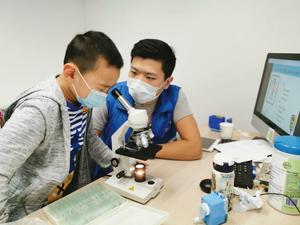 Observing different types of cells under a microscope. (PHOTO PROVIDED TO CHINA DAILY)
Observing different types of cells under a microscope. (PHOTO PROVIDED TO CHINA DAILY)
Breeding or cultivating geniuses is no small matter, and it’s particularly critical for Hong Kong as it marches toward an era of science and technology.
Genius Development — the city’s first and largest STEM (science, technology, engineering and mathematics) education school — has that task on its shoulders as it strives to become Asia’s largest professional STEM educational institution and cement the STEM education ecosystem in the SAR and on the Chinese mainland.
We’re integrating professional knowledge and practices in our classes to induce the fun of learning. Students can enjoy the learning process, be more active and cultivate the habit of learning
Kenneth Ma, Genius Development Chief Executive Officer and founder
Technology is fast gaining focus in contemporary life, with Hong Kong authorities bent on developing students as lifelong learners of science and technology for the past five years since that mission was set out by the city’s government in 2015. Genius believes gifted students are not born — they’re taught. However, the traditional education system usually relies just on rote memorization and often ignores the importance and effectiveness of interactive learning.
The institution wants children to enjoy learning by first letting them feel it’s fun. It integrates play into learning and allows children to absorb complex knowledge and scientific principles subconsciously so they’ll love learning, making it interesting and stimulating for them.
“We’re integrating professional knowledge and practices in our classes to induce the fun of learning. Students can enjoy the learning process, be more active and cultivate the habit of learning,” said Genius Development Chief Executive Officer and founder
Kenneth Ma.
“We firmly believe geniuses are made, not born,” he reckoned.
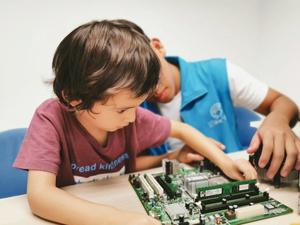 ICT & computer science course. (PHOTO PROVIDED TO CHINA DAILY)
ICT & computer science course. (PHOTO PROVIDED TO CHINA DAILY)
Making geniuses
The Genius classroom is the application of Ma’s lifelong journey of learning.
His goal is to discover and train children and teenagers to be geniuses. Ma considers every student in the Genius classroom his child. They’ll be bred as the inventors, scientists, innovators and information technology entrepreneurs of tomorrow. Genius’ vision is to breed future leaders in science and technology and eventually nurture them to be Hong Kong’s future Nobel laureates, Ma said.
“The Genius classroom will focus more on science as this category is lacking in Hong Kong’s STEM education. We’re focusing on the basics by teaching physics, chemistry, engineering, IT and languages in a systemic manner. Students’ interest in science is aroused in the fun and challenging learning environment whether they’re enjoying the learning of science or just preparing for examinations,” explained Ma.
For parents scouting suitable educational institutions for their children, they must be sure the institutions are of high quality.
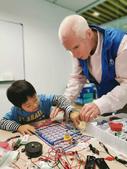 Circuit simulation. (PHOTO PROVIDED TO CHINA DAILY)
Circuit simulation. (PHOTO PROVIDED TO CHINA DAILY)
The institution should ensure that classes are transparent so that parents can know their children can attend classes in a safe environment. Class arrangements should be flexible to support children in the learning process. Teaching quality and experience are key considerations because without these attributes, there’s no way to ensure how much students have learned. Teachers must be experienced enough to deploy various strategies to entice learners to be more proactive in lessons.
Education experts and child psychologists have developed a complete system for children’s and adolescents’ scientific learning according to the stages of a student’s psychological development. Therefore, teaching quality and teacher experience come into full play.
Genius integrated STEM courses, allowing students to experiment for themselves in optics, mechanics, electricity, chemistry, and other subjects to engage in project-based learning, experimental research and group discussions. Science knowledge is applied to life and students’ abilities to innovate and experiment are cultivated.
Science is about exploring and experimenting through an active and hands-on learning approach and children are naturally inquisitive. They like to learn about the world around them. Genius designed programs to nurture children who learn to think like scientists to understand the evolving world, who are ready to embrace newly discovered scientific concepts and explore infinite possibilities. It also aims to nurture students to excel in the scientific community through strong emphasis on experimental techniques, critical thinking and the spirit of collaboration based on the institution’s core teaching beliefs.
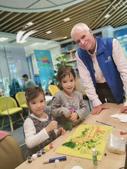 Building a night city. (PHOTO PROVIDED TO CHINA DAILY)
Building a night city. (PHOTO PROVIDED TO CHINA DAILY)
International team of experts
The courses are developed by the school’s international team of researchers. Through the courses, students learn from an early stage to understand the key points of knowledge and scientific techniques that normally high-school students are required to master, and this lays a solid foundation for future education and examination preparation.
Ma and his team, with their educational backgrounds at US-based Harvard University and the Massachusetts Institute of Technology, as well as UK-based Cambridge University, know the importance of professional insights and international perspective in making Genius a high-end STEM education school brand. The company has invested heavily in recruiting experienced teachers, developing syllabus and furnishing educational facilities to provide prime education resources for students.
The school has recruited teachers from renowned universities around the globe to refine and integrate the interdisciplinary studies of science, technology, engineering, arts and mathematics. It’s also in collaboration with several multinational companies and organizations to introduce teaching materials at several international and public schools in Hong Kong.
For students to meet the entrance standards of both Hong Kong and overseas universities, the school has refined the most important learning requirements in science (physics, biology and chemistry), technology, engineering, and maths for the IGCSE, SSAT, SAT, ACT, IB, A-Level, GCE and AP examinations. Students can acquire a systemic foundation for their future college and university entrance examinations.
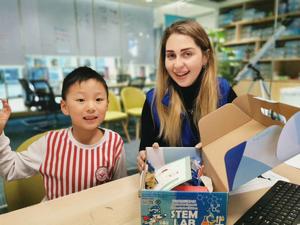 A STEM course. (PHOTO PROVIDED TO CHINA DAILY)
A STEM course. (PHOTO PROVIDED TO CHINA DAILY)
Technology in the classroom
In addition to formulating study materials, educational institutions should capitalize on the use of technology, such as computer software, to foster students’ learning interest and effectiveness. The design and planning of the learning syllabus should be innovative and modified every year, based on the needs of examinations or social development.
Genius has invited industry experts and teachers with outstanding achievements in their respective fields to join its research and development team and faculty. For example, the institution has developed proprietary educational software and apps to ensure the STEM course syllabus is line with current trends. It also incorporated Google’s teaching materials into its own to provide children with the best learning experience using the latest technologies.
The crisis and the future
Amid the novel coronavirus pandemic, many of Hong Kong’s educational institutions have been severely disrupted, with many canceling classes. Genius has worked in three aspects to turn the crisis into opportunities.
The first concerns the business feedback system. Educational institutions should formulate information feedback mechanisms to allow parents to monitor their children’s learning progress. Apart from learning reports filed by the institutions, some of them will also conduct regular face-to-face meetings with parents to
fine-tune study schedules in the next learning cycle.
The school adopts a “one-to-one” approach in conducting online classes, covering students in Hong Kong and on the mainland. Students are required to study the syllabus materials in advance so they can acquire the basic knowledge and understanding of the subject matter before attending the online classes. If they have questions, they can raise them with the teachers, thus ensuring the teaching quality and effectiveness of online classes.
The institution further arranges flexible teaching classes to prevent cross-infection among students. For example, offline classes were being conducted prior to March 19, but these were dropped and replaced by online lessons after the coronavirus outbreak escalated.
One-to-one offline lessons resumed on April 12.
Genius also leverages on business crises to expand educational resources. Apart from teaching quality, it’s imperative for educational institutions to invest in experienced and qualified teachers. Educational institutions should facilitate life-long learning of teachers to enable them to accumulate knowledge to meet students’ needs. An excellent educational institution should provide standards of systemic training and performance evaluation for teachers that are conducive to the institution’s long-term development.
Amid the pandemic, Genius is devoting more time and resources to designing and integrating STEM courses, procuring more teaching facilities and equipment, as well as opening new teaching laboratories in the school branch located in Cyberport.
“The epidemic presents a big challenge to every business organization,” said Ma.
“If you’re unprepared, then you’ll be swallowed up in the storm and will not be able get out of it. If you’re fully prepared, you’ll have the ability to turn challenges into opportunities. Genius, through various response measures, has mitigated the effects of the pandemic to the minimum,” he said.


